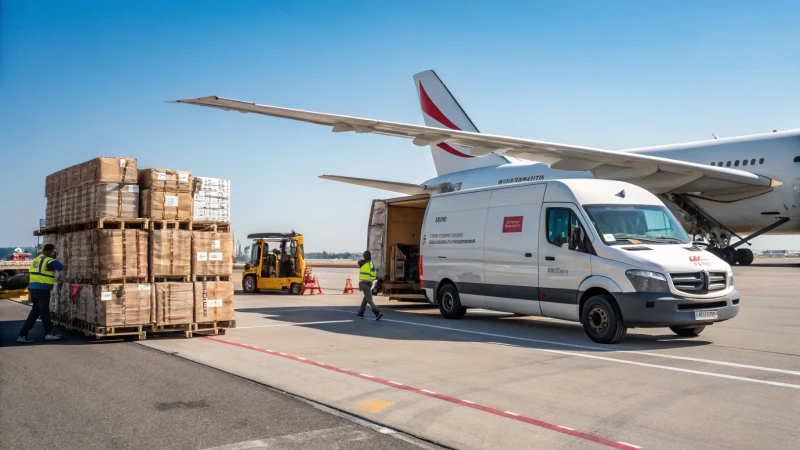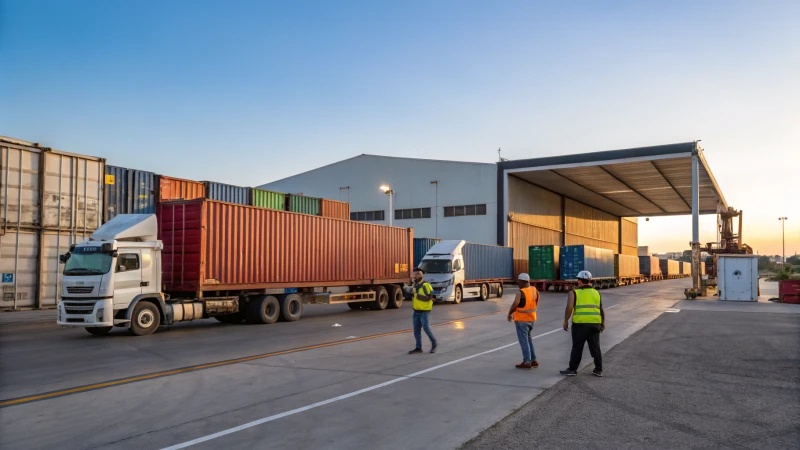If you've ever found yourself biting your nails over shipping delays from China, you're not alone. It's a common frustration in the import business.
To solve shipping delays from China, I recommend planning orders well in advance, especially during peak seasons. Opt for faster shipping like air freight, partner with trustworthy logistics providers, diversify your shipping options, ensure accurate documentation, and track shipments in real-time for proactive solutions.
It’s not just about ticking boxes; it’s about crafting a strategy that fits your business like a glove. Picture this: it's mid-January, and I'm already prepping for Chinese New Year. By ordering early and leaning on reliable logistics partners, I've dodged many a shipping fiasco.
Choosing air freight has saved me time when deadlines loomed large, and I can’t stress enough the peace of mind real-time tracking brings. Each step, from accurate paperwork to diversified shipping options, has been a game-changer in keeping my supply chain flowing smoothly.
Air freight is faster than sea freight for shipping.True
Air freight generally takes days, while sea freight can take weeks.
Real-time tracking is unnecessary for shipments.False
Real-time tracking helps monitor progress and address delays promptly.
How Can Early Order Planning Prevent Delays?
Ever felt like you're racing against time to get your orders shipped? I have, and here's how early planning saved me from chaos.
By placing orders early, I reduce the risk of delays by allowing more time for processing, cutting down on frantic last-minute rushes, and negotiating better deals with suppliers. This proactive strategy ensures my supply chain runs smoothly and my deliveries stay on schedule.

The Importance of Timely Order Placement
Placing orders well in advance allows businesses to sidestep common pitfalls that can lead to delays. By anticipating high demand periods and accounting for seasonal fluctuations1, companies can manage their inventory more effectively.
I remember that one holiday season when I didn't place my orders early enough. The rush was insane, and I could barely keep up with demand. Now, placing orders well in advance is a no-brainer for me. It helps me avoid those dreaded last-minute hiccups by anticipating peak periods and managing my inventory better.
Negotiating with Suppliers
Engaging suppliers early gives companies the leverage to negotiate better terms. This can include securing priority production slots or obtaining discounts for bulk orders, which further enhances the efficiency of the supply chain process2.
Engaging with suppliers early has been a game-changer for me. It not only gives me leverage to negotiate better terms but also secures priority production slots. I've even managed to snag discounts for bulk orders, which makes the whole supply chain process much more efficient.
Selecting Reliable Shipping Options
Choosing the right shipping method is crucial. Opting for faster services like air freight, although costlier, can be beneficial during time-sensitive situations. It's also wise to diversify shipping partners to mitigate risks associated with logistics delays.
When it comes to shipping, I've learned the hard way that choosing the right method is crucial. Air freight has become my go-to for time-sensitive deliveries, despite the higher cost. Diversifying my shipping partners has also helped reduce risks associated with logistics delays.
| Shipping Method | Advantages | Disadvantages |
|---|---|---|
| Air Freight | Fast delivery | Higher cost |
| Sea Freight | Cost-effective | Slower delivery |
| Express Services | Speed and reliability | Limited to smaller packages |
Real-Time Tracking and Communication
Implementing real-time tracking systems can provide visibility into the shipment process. This allows businesses to react promptly to any unforeseen issues. Effective communication with logistics partners is key to resolving potential delays swiftly.
Investing in real-time tracking systems has been invaluable. It's like having a window into the shipment process, allowing me to react promptly if issues arise. Keeping open lines of communication with logistics partners is vital to resolving any potential delays quickly.
Accurate Documentation and Packaging
Ensuring that all documentation is accurate and that products are properly packaged can prevent customs delays and reduce the risk of damage during transit. This proactive approach helps maintain a smooth flow of goods3 through the supply chain.
I can't stress enough how important accurate documentation and proper packaging are. They prevent customs delays and reduce the risk of damage during transit, ensuring a smooth flow of goods through the supply chain. Trust me, double-checking everything before shipping can save you a lot of headaches later.
Early order placement avoids high demand delays.True
Anticipating demand allows companies to manage inventory effectively.
Air freight is the cheapest shipping method available.False
Air freight is faster but more expensive than sea freight.
What Are the Fastest Shipping Options Available?
Ever felt the panic of a package that needs to arrive yesterday? I certainly have!
The quickest shipping options are air freight, express courier services like FedEx First Overnight, and specialized logistics solutions. These ensure fast delivery by optimizing routes and using dedicated networks.

I remember that one time when a crucial shipment was stuck in transit, and I was pacing like a cat on a hot tin roof. The stress of wondering if it would make it on time was all too real. That’s when I realized how vital choosing the right shipping option is.
Air Freight
Air freight is your best friend when you need something sent internationally and fast. It's like calling in a favor from a friend who happens to be a pilot! This method slashes transit times compared to sea freight, making it perfect for urgent deliveries. Airlines such as DHL and UPS have this down to a science.
| Carrier | Estimated Delivery Time |
|---|---|
| DHL | 1-3 days |
| UPS | 1-2 days |
I've learned the hard way how valuable air freight services4 can be when time is of the essence.
Express Courier Services
When I think of speed, express courier services come to mind. Companies like FedEx and UPS offer next-day delivery services, perfect for those "Oh no, I forgot!" moments. FedEx First Overnight, for example, makes sure your package is top of the morning priority.
| Service | Speed |
|---|---|
| FedEx First Overnight | Next morning delivery |
| UPS Express Critical | Same-day delivery |
Knowing about FedEx First Overnight5 has saved me more than once in tight situations.
Specialized Logistics Solutions
For times when you need something bespoke, specialized logistics solutions are the answer. These services cater to specific needs with options like door-to-door express and priority handling. They're a godsend when dealing with high-value goods.
Discover more about specialized logistics6 solutions tailored for speed and efficiency.
Factors Affecting Shipping Speed
Several things can affect how quickly your package travels:
- Route Optimization: Like taking shortcuts you wish you knew about sooner.
- Customs Clearance: Proper documentation can save you from unexpected delays.
- Real-Time Tracking: Keeps you in the loop, helping you dodge potential hold-ups.
Understanding these factors can make all the difference. For more insights, check out factors affecting shipping7 speeds.
Navigating shipping options might seem daunting, but with the right knowledge, you can make sure your packages never arrive fashionably late!
Air freight is faster than sea freight for international shipping.True
Air freight significantly reduces transit times compared to sea freight.
FedEx First Overnight guarantees same-day delivery.False
FedEx First Overnight prioritizes next morning delivery, not same-day.
Why Is Choosing Reliable Logistics Partners Essential?
Imagine losing a major client because your shipment was delayed. That's why choosing the right logistics partner isn't just smart—it's essential.
Choosing reliable logistics partners ensures timely deliveries, minimizes disruptions, and enhances customer satisfaction. It reduces risks associated with shipping, such as delays and damage, fostering trust and long-term business relationships.

The Impact on Timely Deliveries
When I first started out in the import/export business, I quickly learned that timing is everything. One late delivery during a holiday season meant losing a significant client—lesson learned. Having a reliable logistics partner ensures goods arrive on time, which is crucial in maintaining customer trust and satisfaction. A missed deadline can not only upset customers but also jeopardize future orders. Timely deliveries8 also mean better inventory management, helping me stay on top of stock levels.
Minimizing Risks and Disruptions
I remember one stressful experience with customs delays that nearly derailed an entire shipment. That's when I realized the value of a trustworthy logistics partner. They help reduce risks associated with international shipping, such as customs delays or damage during transit. By minimizing these disruptions, I can focus more on growth9 instead of worrying about logistical hiccups that often accompany global trade.
| Risk Factor | Impact | Mitigation Strategy |
|---|---|---|
| Customs Delays | Increased shipping time | Accurate documentation |
| Transit Damage | Financial loss | Proper packaging |
| Communication Gaps | Misunderstandings in operations | Regular updates and tracking |
Enhancing Customer Satisfaction
There’s nothing quite like the thrill of positive customer feedback rolling in after a successful shipment. When logistics run smoothly, customer satisfaction naturally increases. Customers appreciate when their orders arrive promptly and in pristine condition. This not only fosters repeat business but also encourages positive reviews10, which are priceless for any business.
Building Long-term Relationships
Over time, I've realized that reliability fosters trust, which is foundational for long-term partnerships. Businesses prefer to work with partners who have proven their dependability over time, making reliable logistics a critical factor in sustaining these relationships11. Incorporating these elements into my logistics strategy has significantly enhanced my business's efficiency and reputation, setting the stage for sustained success.
Reliable logistics ensure timely deliveries.True
Reliable logistics partners help maintain schedules, boosting customer trust.
Customs delays are unavoidable in logistics.False
Accurate documentation can mitigate customs delays, ensuring smooth transit.
Why Should You Diversify Your Shipping Providers?
When I first ventured into logistics, I thought sticking with one shipping provider was the safest bet. But I've since learned that diversifying is like having multiple lifelines when unexpected disruptions hit.
Diversifying shipping providers spreads risks by relying on multiple carriers, reducing the chances of delays and service interruptions from one source, thus enhancing reliability.

Understanding the Risks of Single Provider Dependency
Imagine all your eggs in one basket. That's what relying on a single shipping provider feels like. A few years ago, I faced a major hiccup when my sole logistics partner12 went through operational challenges, leaving my shipments stranded. That experience taught me the importance of spreading dependencies. By engaging multiple providers, I've managed to keep things moving smoothly even when one carrier hits a snag.
Benefits of a Diverse Shipping Strategy
Adopting a diverse shipping strategy is like having a toolkit where each tool serves a different purpose. For me, it's been about matching the right provider with my needs at any given time—whether it's speed or cost-efficiency. When air freight provides unmatched speed but at a higher cost, I can opt for sea freight for more budget-friendly shipments. This flexibility has allowed me to adapt quickly to market fluctuations, giving my business a competitive edge.
| Provider | Strengths | Weaknesses |
|---|---|---|
| Carrier A | Fast transit times | Higher costs |
| Carrier B | Lower shipping rates | Slower delivery times |
| Carrier C | Extensive global network | Limited in peak seasons |
Real-World Examples
Take peak seasons like Chinese New Year13 as an example. Before diversifying, my shipments would be caught up in delays, creating a domino effect on my supply chain. But now, with multiple carriers at my disposal, I navigate through these periods seamlessly. Even when one carrier struggles to keep up with demand, others fill the gap, ensuring my operations run without a hitch.
Implementing a Multi-Carrier System
Switching to a multi-carrier system wasn't overnight. It required evaluating how each provider performed and setting clear criteria for new partners. I also invested in a shipping management system14 to oversee operations and track shipments, making it easier to coordinate across different carriers.
Challenges to Consider
While diversification has its perks, it comes with its set of challenges. Coordinating with multiple providers requires standardized processes to ensure consistent service quality. It's a balancing act but one that pays off in reliability and peace of mind.
In conclusion, diversifying shipping providers was a game-changer for me. It's not just about spreading risks; it's about crafting a resilient strategy that keeps my business humming smoothly even in rough waters.
Using one shipping provider increases risk of service disruption.True
Relying on a single provider can lead to vulnerabilities like disruptions.
Diversifying shipping providers guarantees zero delays.False
While it reduces risks, diversification doesn't eliminate all delays.
Why is Accurate Documentation Crucial in Avoiding Delays?
Ever scrambled to find a lost document just when you needed it most? Accurate documentation is a lifesaver, preventing chaos and keeping everything on track.
Accurate documentation prevents delays by ensuring clarity, compliance, and efficient communication. It facilitates seamless operations, reduces misunderstandings, and enhances accountability, ultimately minimizing time wastage and operational hiccups.

Enhancing Clarity and Communication
I remember the time I was waiting for a shipment that seemed to be stuck at customs forever. Turns out, a tiny error in the paperwork was the culprit. In logistics, clear documentation is the difference between smooth sailing and endless headaches. It ensures that customs processes15 are expedited and goods move swiftly across borders.
Similarly, in healthcare, precise medical records are not just paperwork; they're lifesavers. Imagine a scenario where a patient's allergies were missed because of unclear notes—accurate documentation here prevents such critical errors.
A well-documented legal agreement ensures all parties are on the same page, preventing costly disputes. Document clarity eliminates room for misinterpretation, which can lead to procedural delays.
| Sector | Importance of Documentation |
|---|---|
| Logistics | Expedites customs clearance |
| Healthcare | Prevents treatment errors |
| Legal | Reduces disputes |
Ensuring Compliance and Accountability
In my business, compliance is king. I’ve learned that in regulated industries like healthcare and law, proper documentation isn't just nice to have—it's essential. It upholds the standards set by governing bodies. In healthcare, it supports patient safety by ensuring adherence to treatment protocols.
Legal documentation provides evidence of compliance with regulatory requirements, safeguarding against legal repercussions. This level of accountability16 fosters trust and reliability, crucial for organizational success.
Streamlining Operations
Picture this: You're trying to find a needle in a haystack, and suddenly someone hands you a magnet. That’s what accurate documentation feels like—it makes everything easier. Incorporating accurate documentation streamlines operations by detailing every step of a process. For instance, in import/export trade, detailed shipping documents ensure that inventory management is precise and predictable.
By using checklists and templates, businesses can maintain consistency and efficiency. These tools help in reducing human error and ensuring that every transaction is thoroughly documented.
- Checklist Benefits:
- Reduces human error
- Maintains consistency
- Ensures thorough documentation
Mitigating Risks
Accurate documentation acts as a safeguard against potential risks. In logistics, it helps in identifying issues17 early, allowing for corrective measures before problems escalate.
In legal scenarios, well-maintained records can protect against disputes or claims that could otherwise cause significant delays. Documentation serves as a reliable source of truth during conflicts or audits.
In conclusion, whether it's managing shipments or ensuring patient safety, accurate documentation is the unsung hero that keeps everything running smoothly. It's a bit like having a map on a road trip—without it, you're just driving aimlessly.
Clear documentation expedites customs processes.True
Accurate documentation ensures smooth customs clearance, reducing delays.
Legal documentation increases procedural delays.False
Proper legal documentation prevents disputes, thus avoiding delays.
How Can Real-Time Shipment Tracking Benefit Your Business?
Remember the first time you tracked a package, watching its journey unfold? Imagine doing that for every shipment in your business, knowing exactly where your goods are at any moment. It's not just fascinating—it's a game-changer.
Real-time shipment tracking benefits businesses by enhancing visibility, improving customer satisfaction, and increasing operational efficiency. It lets companies monitor shipments closely, anticipate issues, and provide accurate delivery updates, boosting trust and competitiveness.

Enhanced Visibility
I still recall the stress of not knowing where a crucial shipment was during a peak sales season. With real-time tracking, I now have unmatched transparency into every stage of the shipping process. This visibility helps me anticipate potential delays and make informed decisions to ensure resources are allocated efficiently. Knowing precisely where my shipments are allows me to address disruptions quickly and maintain smooth operations.
- Stage | Visibility
- ------------- | ------------------------
- Transit | Real-time location updates
- Destination | Estimated time of arrival
Improved Customer Satisfaction
I've learned that today's customers crave accuracy and timeliness. Implementing real-time tracking has empowered me to meet these expectations by providing precise delivery information. This capability has not only increased customer satisfaction rates but also fostered loyalty.
By leveraging tracking data, I've developed a more personalized communication strategy18, proactively updating customers about their delivery statuses. This approach reduces anxiety and builds trust between my business and its clients.
Increased Operational Efficiency
Armed with real-time data, I've streamlined my logistics processes. Having a clear picture of my supply chain allows me to reduce inefficiencies and optimize routes, ultimately saving time and resources.
Additionally, this data has enhanced my inventory management19, aligning stock levels with customer demand and minimizing the risk of overstocking or stockouts. It has enabled me to forecast needs more accurately and swiftly respond to market changes.
Implementing real-time tracking has been a pivotal move in enhancing my company's competitive edge in the logistics sector. By leveraging these benefits, I'm better equipped to navigate the complexities of global trade and deliver superior service to my customers.
Real-time tracking improves customer satisfaction.True
It provides accurate delivery updates, reducing anxiety and building trust.
Real-time tracking increases inventory costs.False
It optimizes inventory management, reducing overstocking and stockouts.
Conclusion
To mitigate shipping delays from China, businesses should plan orders early, choose faster shipping options, work with reliable logistics partners, ensure accurate documentation, and utilize real-time tracking.
-
Understanding seasonal fluctuations helps in better planning, ensuring stock availability during peak times. ↩
-
Learn effective negotiation strategies with suppliers to enhance supply chain efficiency. ↩
-
Discover how proper packaging techniques can reduce damage risks and expedite customs clearance. ↩
-
Discover how air freight can offer faster delivery times compared to traditional sea freight. ↩
-
Learn about the specifics of FedEx First Overnight to see if it suits your urgent shipping needs. ↩
-
Explore how specialized logistics solutions can be tailored to meet specific delivery requirements. ↩
-
Understand what influences shipping speeds to better optimize your delivery processes. ↩
-
Explore how timely deliveries enhance customer trust and streamline business operations. ↩
-
Learn how minimizing disruptions can help your business focus on growth and innovation. ↩
-
Discover how reliable shipping leads to positive customer experiences and reviews. ↩
-
Understand how trust built through reliability strengthens business relationships. ↩
-
Discover key criteria for selecting dependable logistics partners, ensuring smooth and efficient supply chain operations. ↩
-
Understand how Chinese New Year affects shipping schedules and strategies to mitigate its impact. ↩
-
Learn how shipping management systems enhance coordination and tracking across multiple carriers. ↩
-
Understanding customs documentation can expedite processes and prevent delays in international shipping. ↩
-
Discover how accurate documentation enhances accountability and compliance within organizations. ↩
-
Explore how proper documentation aids in risk management by identifying and mitigating potential issues early. ↩
-
Discover effective communication strategies that utilize shipment tracking data to enhance customer engagement. ↩
-
Understand how real-time tracking influences inventory decisions, improving accuracy and reducing waste. ↩




